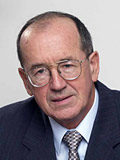President of the National Assembly of the Republic of Slovenia, France Cukjati, dr. med.
On the Occasion of National Day and 15th Anniversary of Slovenia's Independence

The maturity of a nation is manifested in the maturity of the decisions made by their political leadership and above all the parliament. Fifteen years ago, we Slovenes proved that, at crucial times in history, we can demonstrate political maturity.
We have a rich parliamentary experience. From the revolutionary year of 1848 until the end of the Habsburg Monarchy in 1918, we, in free and democratic elections, chose our representatives for the Vienna parliament and later, between the two world wars, also for the Belgrade parliament. After 1945 we got our own representative body, the People's Assembly, but it lacked political independence and the democratic nature of free elections.
All this time, we had our own representatives in the parliaments where Slovenia's fate was decided, and many of these representatives had fought bravely for greater national rights. The programme of Unified Slovenia, written in 1848, remained the cornerstone in political dreams of great nationalists for the next one hundred years.
But all that time, the division of Slovenian representatives into the conservative and the liberal camps, arising already in the middle of 19th century, only grew deeper until the Slovenian people finally divided at the time of the communist revolution in the middle of the 20th century. Instead of joining their political forces for the good of Slovenia, some Slovenian politicians, blinded by the desire for party or ideological domination, sold out to foreign political forces - during the reign of the Habsburg Monarchy to German socialists, in the Kingdom of Yugoslavia to Serbian centralism, during WWII to foreign ideologies, and after WWII to Belgrade authority.
The 'sell-out' continued until the middle of the 1960s, when Slovenian national consciousness had started to grow stronger, also within the liberal communist lines; and although it was quickly subdued, it was never completely suppressed. At the end of the 1980s, things came to a head at all levels. A will for an independent state unleashed, a will that was stronger than party and ideological differences, and that gradually flooded cultural, media and political spaces.
Only one thing was needed; the freedom of political association and a free and democratic election. We achieved political relaxation, and the people could with all their heart and with the determination they had expressed at the plebiscite, sing: Slovenia - my country! We established our parliament, which had a very colourful party structure and was sharply polemical but, nevertheless, unanimous in adopting the Constitutional Charter on the Independence and Sovereignty of the Republic of Slovenia. We established Slovenian armed forces, small in arms but courageous at heart.
Because of this, on 25 June 1991, a new country could be born, the Republic of Slovenia.
